THE STORY
I am using Firebase Realtime Database in my app. I have a model something like this.
class Item {
int mItemName;
// Simplified for brevity
}
Now, this stores the field as itemName in my real time database. But I don't want to use that naming convention. I want the naming pattern to be this, item_name.
WHAT I DID
I used the @PropertyName("item_name") above the field like this,
class Item {
@PropertyName("item_name")
int mItemName;
// Simplified for brevity
}
THE PROBLEM
Firebase seems to just ignore the annotation completely. There is no way I am able to change the property names for serialization and deserialization.
Any help would be highly appreciated.
EDIT
Here is the complete model class in concern,
public class FileModel {
@PropertyName("file_id")
String mFileId;
@PropertyName("file_name")
String mOriginalFileName;
@PropertyName("file_path")
String mFilePath;
@PropertyName("file_type")
String mFileType;
@PropertyName("last_modified")
Long mFileLastModified;
@PropertyName("file_size")
String mFileSize;
@Exclude
private boolean mIsSelected;
/**
* Must have empty constructor for JSON deserialization by Firebase
*/
public FileModel() {
}
public FileModel(String fileId, String originalFileName,
String filePath, String fileType, Long fileLastModified, String fileSize) {
this.mFileId = fileId;
this.mOriginalFileName = originalFileName;
this.mFilePath = filePath;
this.mFileType = fileType;
this.mFileLastModified = fileLastModified;
this.mFileSize = fileSize;
}
public String getFileId() {
return mFileId;
}
public void setFileId(String fileId) {
this.mFileId = fileId;
}
public String getOriginalFileName() {
return mOriginalFileName;
}
public void setOriginalFileName(String originalFileName) {
this.mOriginalFileName = originalFileName;
}
public String getFilePath() {
return mFilePath;
}
public void setFilePath(String filePath) {
this.mFilePath = filePath;
}
public String getFileType() {
return mFileType;
}
public void setFileType(String fileType) {
this.mFileType = fileType;
}
public Long getFileLastModified() {
return mFileLastModified;
}
public void setFileLastModified(Long fileLastModified) {
this.mFileLastModified = fileLastModified;
}
public String getFileSize() {
return mFileSize;
}
public void setFileSize(String fileSize) {
this.mFileSize = fileSize;
}
public boolean getIsSelected() {
return mIsSelected;
}
public void setIsSelected(boolean isSelected) {
this.mIsSelected = isSelected;
}
@Override
public boolean equals(Object o) {
if (this == o) return true;
if (o == null || getClass() != o.getClass()) return false;
FileModel model = (FileModel) o;
if (mIsSelected != model.mIsSelected) return false;
if (mFileId != null ? !mFileId.equals(model.mFileId) : model.mFileId != null) return false;
if (mOriginalFileName != null ? !mOriginalFileName.equals(model.mOriginalFileName) : model.mOriginalFileName != null)
return false;
if (mFilePath != null ? !mFilePath.equals(model.mFilePath) : model.mFilePath != null)
return false;
if (mFileType != null ? !mFileType.equals(model.mFileType) : model.mFileType != null)
return false;
if (mFileLastModified != null ? !mFileLastModified.equals(model.mFileLastModified) : model.mFileLastModified != null)
return false;
return mFileSize != null ? mFileSize.equals(model.mFileSize) : model.mFileSize == null;
}
@Override
public int hashCode() {
int result = mFileId != null ? mFileId.hashCode() : 0;
result = 31 * result + (mOriginalFileName != null ? mOriginalFileName.hashCode() : 0);
result = 31 * result + (mFilePath != null ? mFilePath.hashCode() : 0);
result = 31 * result + (mFileType != null ? mFileType.hashCode() : 0);
result = 31 * result + (mFileLastModified != null ? mFileLastModified.hashCode() : 0);
result = 31 * result + (mFileSize != null ? mFileSize.hashCode() : 0);
result = 31 * result + (mIsSelected ? 1 : 0);
return result;
}
@Override
public String toString() {
return "FileModel{" +
"mFileId='" + mFileId + '\'' +
", mOriginalFileName='" + mOriginalFileName + '\'' +
", mFilePath='" + mFilePath + '\'' +
", mFileType='" + mFileType + '\'' +
", mFileLastModified=" + mFileLastModified +
", mFileSize='" + mFileSize + '\'' +
", mIsSelected=" + mIsSelected +
'}';
}
}
